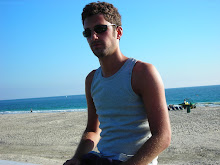It is entirely appropriate, I believe, for the Jewish High Holydays to take place in our autumn. A time of change and newness, September represents important phases and stages in our lives: new school terms, new University years, new jobs. So for the Jewish New Year to fall during this busy period works well in my opinion. It sits nicely alongside these more secular occasions.
However, this year, perhaps more than any other, I have found myself questioning the festivals of Rosh Hashanah and Yom Kippur. For the uninitiated, these two festivals are generally considered to be the most important in the Jewish calendar; the first being a celebration of the birthday of the world, of the creation story, and thus a New Year under the Hebrew timescale, the second being the culmination of ten days of internal soul-searching and repentance for all manner of yearly sins and wrongs, ending in Yom Kippur itself: a 25-hour long fast where Jews refrain from eating or drinking, or other earthly luxuries from sex to shaving and even wearing leather shoes. On Yom Kippur, Jews openly articulate their wrongdoing from the previous year and ask for forgiveness from God.
On many levels, this is so important. What could be more suitable, in an age of selfishness and arrogance, where materiality takes precedent over spirituality, than to cast our minds back through the vastness of the previous twelve months and not only admit our failings, but to understand why we did them. I am a reflective young man, and feel such a Judaic device is to be applauded for the most part. The problem I have is in the nature of the repentance. It seems to me to be a little strange to be asking for forgiveness from a being, an entity, whatever you want to call him, her or it, that we have little or no evidence for the existence of, beyond what we have been told are ocular examples in scripture.
Let me be clear, today's blog is not to shatter the illusion of divinity that governs most world religions. I simply do not know whether there is or is not a God. Being brutally honest, I am one of those who goes about ritual or ceremonial duties more out of hope than expectation, believing it still important to maintain the tradition (and remembering the genuine history that prompted them) rather than completely do away with it, regardless of what the net result will be in the long run. I am, however, 100% certain in my own mind that it is possible to be Jewish and still have major doubts. After all, self-doubt is a paragon virtue of modern Judaism, so I suppose I should fit right in. There is, friends, a generational problem here, however. If I had this conversation with my mother, for example, her unflinching support for everything she has been told and taught in her life would no doubt eventually evolve into an argument with me about my lesser faith, my lapsed ability to trust explicitly.
So where do I fit in amongst the denominations of my religion? Do I fit in at all? There are, sadly, an annoying few who would claim I have no place in it whatsoever, a cabal of near-medieval prelapsarians whose literal ideology I believe to be not only morally wrong but equally socially dangerous. There are some, be they Jews, Muslims, Christians, you name it, who hold steadfastly to everything that scripture and custom and influential leaders tells them. For the most part, this is fine. In many ways it is to be applauded. There is much, as an example, within the Jewish Torah that is relevant to modern-day life, offering important distinctions between right and wrong, imploring responsibility and charity, kindness and forgiveness, moral guides to what is at times an amoral world. But it also talks about stoning rebellious sons to death at the city gates, or that homosexuality is an abomination, and even sanctions a father's right to sell his youngest daughter into slavery. By any modern moral standard, all of these are just plain wrong. The vast majority of British Jews will treat such commandments in the same way they treat meat from a pig: with some distance. There remains a minority, the same minority who consider me to be as Jewish as Egyptian footballer Mido, who will still cling to this prose as, forgive the pun, gospel.
Judaism could be doing a better job of putting on a united front. At a time when the wrongdoings of the state of Israel (goodness me that is worth a blog on its own), for example, turn attentions towards Judaism more generally, I am concerned that many people who know little about the religion in this country will see a group of people divided, of denominations clashing and bickering, resolutely and consistently articulating their differences rather than their similarities, the shared traditions and cultural elements that have sustained Judaism for thousands of years.
All across the UK over the next couple of days, Jewish families will come together both in synagogues and at home to celebrate a New Year. They will dip apple pieces into honey to help represent what we all hope will be a sweet year to come. These are the sort-of rituals that I can base a life on. Not just because I enjoy the taste of apple dipped in honey, but because it is a simplistic gesture that means a whole lot more. It is about the hope of a good year, yes, but it's also a symbolic moment shared with loved ones, and as Judaism is a family-centric religion, placing an importance on the family unit and shared family experiences, it is entirely appropriate to spread that hope around those we love and care about. Similarly, in ten days time, Jews will again congregate together as the autumn light fades and the gates of repentance start to shut, in order to break their Yom Kippur fast together, proving that even at our most personal and reflective of moments we still supplement this with a familial element. Such traditions, which include Shabbat meals on Friday evenings, or the Passover Seder, with its own myriad customs and traditions, and so on, can help Judaism thrive, and not the 'more righteous than thou' faction that stains any modern, liberal spirituality.
We need to respect each other more. I want to go about my business without being concerned at what a fellow Jew thinks of what I do. Mine is a private Judaism, one that all to often sadly clashes with its public counterpart. In my opinion (and remember this is just my opinion, with no disrespect meant to any one of my many friends and family members who think differently), we could all be afforded a little bit more leeway and freedom from judgment to be as religious as we want, or do not want, to be. Ultimately, it is more important, surely, to try to be a good person than solely a good Jew and nothing else. Liberalism, acceptance, open-mindedness is key.
This Rosh Hashanah and Yom Kippur, I will put on my suit and go to synagogue with my family. Most of it will go through one ear and out the other, and even then my ears will probably still be ringing from the gig I'm going to tonight at Wembley, even though technically Rosh Hashanah begins at sundown this evening. I'll probably not enjoy the company of those around me that much (becoming no doubt incensed by the same whispering, gossiping and general looking around for other people that I will no doubt also partake in), save for my friend Jack, who I will no doubt sit with and quietly giggle with when the choir comes in flat, or sharp, or both. I know that the Rabbi will offer a sermon on how important it is for young people to come to shul every week (why?), and to stay in contact after their Barmitzvahs (surely if you are a 'man' post-Bar Mitzvah you can decide for yourself if you want to go to shul or not, free from pressure or judgment from others?), and how the majority of the congregation only turns up twice a year and that this is not good enough (according to who?). I know I will probably disagree with him, but equally that somewhere in the sermon he'll say something profound that will grab my attention for a moment or two.
I know that I will get very little from my synagogue attendance over the next couple of weeks, until the final service of Yom Kippur, known as Neilah. On Yom Kippur I attend Neilah without fail every year, usually with both my Dad and Grandpa. It is important to me and without doubt I feel at my most spiritual, most Jewish, most at one with my family, community, congregation, the works, during Neilah on Yom Kippur. Poetically, it is a fascinating service, full of stylised prose and poetry, of close choir harmonies, all juxtaposing perfectly against the gloom of the gather dusk, where the candles in the synagogue flicker against the darkening skies. It is atmospheric and, frankly, wonderful. It is the only time I properly think about what I've done over the previous year, something I am meant to do over the entirety of Yom Kippur but which eludes me until the final couple of hours, after the anguish at my inevitable defeat at the FA Premier League Monopoly board game to my friend Jonny during the afternoon has calmed down.
It is clear, I am sure, that I am a walking religious contradiction, unsure of my place within my religion, or even if I want a place, caught between my own personal values and customs, and the wider communal pressure that is hard sometimes to ignore. In just a couple of paragraphs I talked about going to Wembley instead of seeing in the first High Holyday festival this evening, but also about a spiritual connection to later services and my strong support for many of the familial elements of Judaism. Being a good person should, nevertheless, not have to be connected to religion at all. It can be if you want it to, of-course, and this should be lauded; but it does not have to, and as I get older I'm beginning to feel that more and more, without wanting at the same time to say I'm not Jewish. I am what I am.
Clearly this is a religion of differences, and that is fine, as long as we can embrace them, whilst maintaining the traditions and cultural customs upon which it can thrive, rather than descend into a ranting fiasco of discord and disillusion. Of-course I am also aware of the irony, of how my pleading for a more liberal, open-minded, less judgmental religion has clearly clashed against some of my obviously narrow-minded thoughts about the ultra-orthodox mentality.
So be it. On Eruv Yom Kippur, which is the evening beforehand, Jews ask for forgiveness not from God but from mankind. That's something we can probably work on. Certainly I know I need to.

